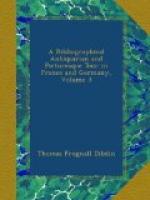There was a frightful, but expressive and well coloured, head of a Dwarf, or Fool, of which Mr. Lewis took a pencil-copy; but it is not of sufficient importance to enclose in this despatch. It is the EARLY GERMAN SCHOOL of Art which is here the grand and almost exclusive feature of attraction—speaking in an antiquarian point of view. ReIchard estimates the number of these pictures at twelve hundred, but I should rather say seven hundred.
I find, however, that it will be impossible to compress all my Augsbourg intelligence in one epistle; and so I reserve the remainder for another opportunity.
[23] [Several years have elapsed since I have received
a letter from Mons.
Le Bret. Is he alive?
If he be living, let him be assured of my
unalterable and respectful
attachment: and that I have unfeigned
pleasure in annexing a fac-simile
of his AUTOGRAPH—from a letter to
me of the date of June 8th
1819: a letter, which I received on the
17th of the same month following—the
very day of our Roxburghe
Anniversary Dinner.
Singularly enough, this letter begins in the
following strain of bibliographical
jocoseness: “Monsieur, et tres
reverend Frere de Boocace
l’Immortel!”]
[Illustration: Signature—f.c. Lebret]
[24] The predominant religion is the Protestant.
Indeed I may say that the
number of Catholics is exceedingly
limited: perhaps, not an eighth
part of the population of
the town.
[25] I presume this to be the earliest date which
any of his books exhibit.
His brother GUNTHER, or GINTHER
(for the name is spelt both ways in
his colophons) began to print
in 1468. Lord Spencer possesses a
beautiful copy (which I obtained
from the library of St. Peter’s
Monastery, at Salzbourg) of
Bonaventure’s Meditations upon the Life
of Christ, of the date
of 1468, printed by G. Zainer, or (Zeiner)
at Augsbourg; and considered
to be the first effort of his press.
[26] The note, above mentioned, was written in Latin:
the Professor telling
me that he preferred that
language to the French, as he thought he
could write it more grammatically.
A Latin note must be rather
a curiosity to my readers:
which, as it is purely bibliographical, and
in other respects highly characteristic
of the bon-hommie of
the writer, shall receive
a place here. After mentioning the books
above specified, the Professor
goes on thus:
“Haec paucula e pluribus notare libuit, quae reliqua temporis angustia ostendere non permisit. Habeo enim alias, quas vocant, editiones principes, e.g. Diogenis Laertii, Bas. 1533-4. Josephi, Bas. 1544. fol. Jo. Chrysostomi [Greek: peri pronoias] 1526-8. Ej. [Greek: peri hierosunes], ib 1525-8. Aliorum Graecorum




